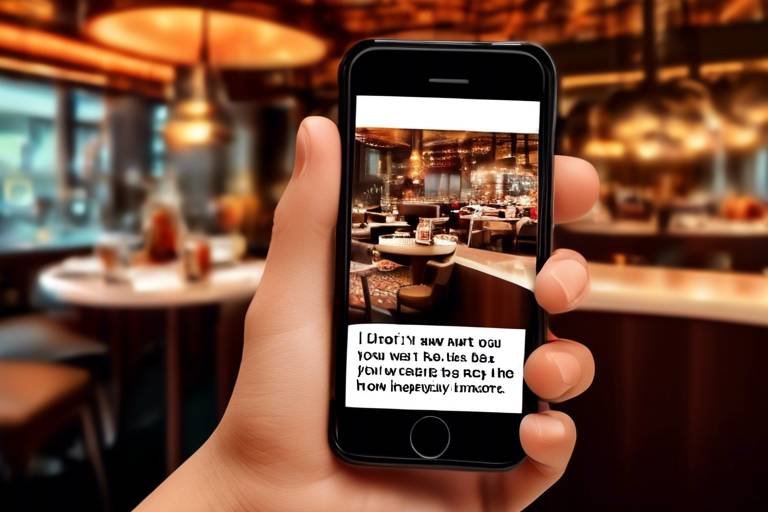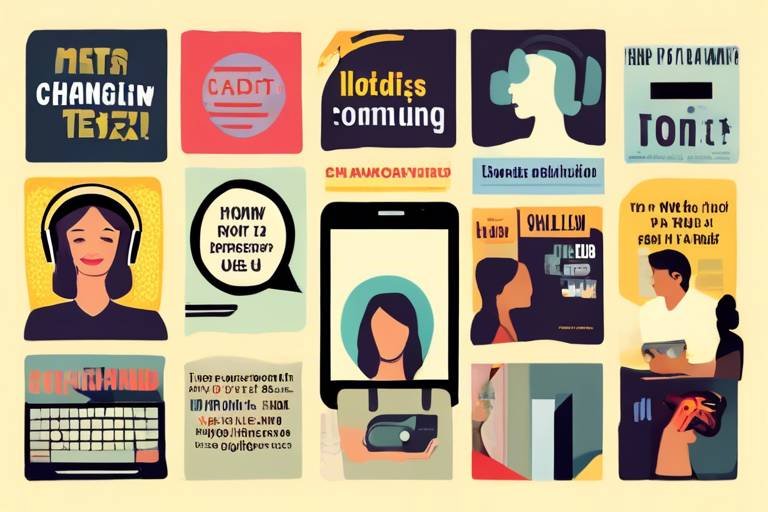How Technology is Reshaping the Hospitality Industry
The hospitality industry is undergoing a remarkable transformation, driven by the rapid advancement of technology. Gone are the days when guests were simply offered a place to stay; today, hotels and resorts are leveraging cutting-edge innovations to create unforgettable experiences. From the moment a guest books their stay to the time they check out, technology plays a pivotal role in enhancing every aspect of their journey. Imagine walking into a hotel where your room's lighting adjusts automatically to your preference, or where a friendly chatbot is available 24/7 to answer your queries. This is not just a dream; it’s the reality of modern hospitality.
As we dive deeper into this topic, we will explore the various technological advancements that are reshaping the hospitality sector. These innovations not only improve guest experiences but also streamline operations for hotel staff. The integration of smart devices, mobile applications, and artificial intelligence has revolutionized how hotels interact with their guests. In this article, we will examine how these technologies create personalized experiences, enhance convenience, and build trust within the industry.
Smart hotels are at the forefront of this technological revolution. They utilize the Internet of Things (IoT) to create a seamless and personalized experience for guests. From automated room controls that adjust temperature and lighting based on individual preferences to smart mirrors that provide information about local attractions, the possibilities are endless. Imagine arriving at your hotel room, and with a simple voice command, you can control everything—from the curtains to the entertainment system. This level of personalization not only enhances guest comfort but also significantly boosts satisfaction levels.
Mobile check-in and check-out systems have become a game-changer in the hospitality industry. They allow guests to bypass long queues at the front desk, making the arrival and departure process a breeze. With just a few taps on their smartphones, guests can check in before they even arrive, unlocking their room doors with digital keys. This streamlined approach not only saves time but also enhances convenience, making the overall experience more enjoyable.
In the wake of the global pandemic, contactless payment solutions have gained immense popularity. Guests can now make transactions quickly and securely, whether they are ordering room service or booking a spa treatment. This not only improves the overall efficiency of hotel operations but also ensures that guests feel safe and comfortable during their stay. The rise of mobile wallets has further simplified this process, allowing guests to make payments with just a tap of their smartphones.
Integrating mobile wallets into hotel payment systems is a significant leap towards enhancing convenience and security. Guests can use their smartphones for transactions, reducing the need for physical contact. This integration not only speeds up the payment process but also allows hotels to keep up with the evolving preferences of tech-savvy travelers.
As technology advances, so does the need for enhanced security measures. The implementation of biometric authentication, such as fingerprint or facial recognition, ensures safer transactions and protects guest data. This builds trust in technology-driven services, allowing guests to enjoy their stay with peace of mind.
Utilizing data analytics, hotels can offer personalized services tailored to individual preferences. By analyzing past behaviors and preferences, hotels can create customized experiences that significantly enhance guest loyalty and satisfaction. Imagine receiving a welcome drink that matches your favorite flavor or being greeted by name upon arrival. This level of attention to detail makes guests feel valued and appreciated.
Virtual and augmented reality technologies are also making waves in the hospitality industry. These immersive experiences allow guests to explore hotel features and local attractions before their arrival. For instance, potential guests can take virtual tours of hotel rooms and amenities, helping them make informed decisions and increasing booking rates.
Virtual tours enable potential guests to explore hotel rooms and amenities online, providing a realistic feel of what to expect. This not only helps in building trust but also enhances the likelihood of bookings, as guests can visualize their stay before making a commitment.
Augmented reality apps enrich the guest experience by providing interactive information about hotel services and local attractions. Imagine pointing your phone at a landmark and instantly receiving details about its history or nearby dining options. This engaging content not only enhances their stay but also encourages guests to explore the local area.
Artificial intelligence and chatbots are transforming customer service in the hospitality sector. With 24/7 availability, these intelligent systems address guest inquiries and requests promptly, improving operational efficiency. Guests can get instant responses to common questions, which frees up staff to focus on more complex needs, enhancing service quality.
AI-driven customer support systems provide instant responses to common queries, ensuring that guests receive timely assistance. This not only improves guest satisfaction but also allows hotel staff to dedicate their time to creating memorable experiences for guests.
Leveraging AI for data analysis helps hotels understand guest preferences and trends. This insight enables them to make informed decisions that improve service delivery and profitability. By analyzing data, hotels can tailor their offerings to meet the evolving needs of their guests, ensuring a competitive edge in the market.
- What are smart hotels? Smart hotels utilize IoT devices to enhance guest experiences through automation and personalization.
- How does mobile check-in work? Mobile check-in allows guests to check in via their smartphones, bypassing the front desk for a quicker arrival process.
- What benefits do contactless payment solutions offer? They provide a secure, fast, and convenient way for guests to make transactions without physical contact.
- How can AI improve guest experiences? AI can analyze guest data to offer personalized services and provide instant support through chatbots.

Smart Hotels
In the ever-evolving landscape of the hospitality industry, are emerging as a game-changer, leveraging the power of the Internet of Things (IoT) to create unparalleled guest experiences. Imagine walking into a hotel room where the lights automatically adjust to your preferred brightness, the temperature is set just the way you like it, and your favorite music starts playing in the background. This is not a scene from a futuristic movie; it’s the reality of smart hotels, where technology meets comfort to enhance guest satisfaction.
These hotels utilize a range of IoT devices that work in harmony to provide a seamless experience. From smart thermostats that learn your preferences to voice-activated assistants that can control room features, the level of personalization is astounding. Guests can easily interact with their surroundings, adjusting settings with a simple command or tap on their smartphones. This not only makes their stay more enjoyable but also fosters a sense of control and ownership over their environment.
Moreover, smart hotels are not just about luxury; they also focus on operational efficiency. For instance, automated systems can manage energy consumption, reducing costs and environmental impact. With smart technology, hotels can monitor occupancy rates in real-time and adjust staffing levels accordingly, ensuring that guests receive prompt service without unnecessary delays. This intelligent use of technology translates into significant savings and a more sustainable business model.
One of the standout features of smart hotels is their ability to offer tailored recommendations. By analyzing guest data, hotels can suggest personalized activities, dining options, or local attractions that align with individual interests. Imagine receiving a notification about a local concert that matches your musical taste or a special discount at a nearby restaurant you’ve been wanting to try. This level of customization not only enhances the guest experience but also builds loyalty, as guests feel valued and understood.
Furthermore, the integration of smart technology extends beyond individual rooms. Common areas, such as lobbies and conference rooms, are also equipped with smart features. For example, smart lighting can adjust based on the time of day or occupancy levels, creating a welcoming atmosphere while conserving energy. Meeting rooms can be outfitted with advanced audio-visual systems that simplify presentations and enhance collaboration, making them ideal for business travelers.
In conclusion, the rise of smart hotels is revolutionizing the hospitality sector. By harnessing the power of IoT, these establishments are not only enhancing guest comfort and satisfaction but are also streamlining operations and promoting sustainability. As technology continues to advance, we can only expect these innovations to become more sophisticated, making our future stays more enjoyable and personalized than ever before.

Mobile Check-In and Check-Out
In today's fast-paced world, the traditional check-in and check-out processes at hotels can often feel like a chore. Long lines and tedious paperwork can put a damper on even the most exciting trips. Enter , a revolutionary approach that streamlines the entire experience, making it as smooth as butter. Imagine arriving at your hotel after a long journey, only to find that your room is ready and waiting for you, all thanks to a few taps on your smartphone. This is not just a dream; it's the new reality for many travelers!
With mobile check-in, guests can complete the registration process before they even set foot in the hotel. By using a dedicated app or the hotel’s website, they can enter their information, select their room preferences, and even make special requests—all from the comfort of their own home. This technology not only saves time but also enhances the overall guest experience. No more fumbling with keys or waiting for a front desk agent to assist you; everything is at your fingertips!
Once you arrive at the hotel, the process gets even better. Many hotels now offer the option of a digital room key. This means that your smartphone becomes your key, allowing you to unlock your door with just a tap. It’s like having a magic wand that grants you instant access to your sanctuary after a long day of travel. The convenience of mobile check-in and digital keys cannot be overstated; it truly redefines the guest experience.
But it doesn’t stop there. The benefits of mobile check-in and check-out extend beyond just convenience. They also enhance operational efficiency for hotels. By reducing the time spent on manual check-ins, staff can focus on providing exceptional service to guests. This shift not only improves guest satisfaction but also boosts the hotel’s bottom line. After all, happy guests are more likely to return and recommend the hotel to others.
Moreover, mobile check-out offers a hassle-free way to settle your bill. Guests can review their charges, make payments, and check out—all through their mobile devices. This feature eliminates the need to stand in line at the front desk, allowing travelers to get on with their day. Whether it's catching a flight or heading out for a day of exploration, mobile check-out ensures that every moment counts.
In summary, mobile check-in and check-out are transforming the hospitality landscape. They not only enhance the guest experience through convenience and efficiency but also empower hotels to operate more smoothly. As technology continues to evolve, we can only expect these innovations to become even more integrated into our travel experiences. So, the next time you book a stay, look for hotels that offer mobile check-in and check-out options. Your future self will thank you!
- What is mobile check-in? - Mobile check-in allows guests to complete the registration process via a smartphone app or website before arriving at the hotel.
- How does mobile check-out work? - Guests can review their charges, make payments, and check out using their mobile devices, eliminating the need to visit the front desk.
- Is my personal information safe with mobile check-in? - Yes, reputable hotels use advanced encryption and security measures to protect guest data during mobile transactions.
- Can I still check in at the front desk if I use mobile check-in? - Absolutely! Mobile check-in is an option, but traditional check-in is still available for those who prefer it.

Contactless Payment Solutions
In the fast-paced world of hospitality, have emerged as a game-changer. Imagine walking into a hotel, and instead of fumbling through your wallet for cash or cards, you simply tap your smartphone or smartwatch to complete your transaction. This seamless experience not only enhances convenience but also aligns with the growing demand for hygiene and safety in a post-pandemic era.
One of the primary advantages of contactless payments is their speed. Guests can check in, make purchases at hotel restaurants, or settle their bills without the typical delays associated with traditional payment methods. This efficiency not only improves guest satisfaction but also allows hotel staff to focus on providing exceptional service rather than managing long lines at the front desk.
Moreover, contactless payment solutions are designed with security in mind. By utilizing technologies such as Near Field Communication (NFC) and tokenization, these systems ensure that sensitive information is encrypted and not easily accessible to potential fraudsters. This added layer of security builds trust with guests, who can feel confident that their financial information is protected.
To give you a clearer picture, here’s a quick comparison of traditional payment methods versus contactless solutions:
| Feature | Traditional Payment | Contactless Payment |
|---|---|---|
| Speed | Slower, requires card swiping or cash handling | Instant, just a tap needed |
| Security | Higher risk of fraud | Encrypted transactions reduce fraud risk |
| User Experience | Involves multiple steps | Simplified and user-friendly |
Additionally, the integration of mobile wallets into payment systems has taken convenience to the next level. Guests can link their bank accounts or credit cards to apps like Apple Pay, Google Pay, or Samsung Pay, allowing them to make transactions with just a few taps. This not only speeds up the payment process but also minimizes physical contact, which is a significant concern for many travelers today.
As hotels continue to embrace these innovations, they are also investing in training their staff to handle contactless transactions effectively. This ensures that whether a guest is a tech-savvy millennial or an older traveler, everyone can enjoy the benefits of modern payment solutions without feeling overwhelmed.
In conclusion, are not just a trend; they are a fundamental shift in how the hospitality industry operates. By enhancing the guest experience, improving security, and streamlining operations, hotels that adopt these technologies are setting themselves apart in a highly competitive market.
- What are contactless payment solutions? Contactless payment solutions allow guests to make transactions without physical contact, typically using NFC technology through smartphones or smartwatches.
- How do contactless payments enhance security? They use encryption and tokenization to protect sensitive financial information, reducing the risk of fraud.
- Can I use my mobile wallet at any hotel? Most modern hotels are adopting mobile wallet integrations, but it's best to check with the specific hotel for their payment options.

Mobile Wallet Integration
In today’s fast-paced world, has emerged as a game-changer in the hospitality industry. Imagine arriving at your hotel after a long flight, tired and eager to settle in. Instead of fumbling through your wallet for cash or cards, you simply pull out your smartphone and complete your check-in with a few taps. This seamless process not only enhances convenience but also makes transactions feel more secure, which is increasingly important in our tech-savvy society.
Mobile wallets, such as Apple Pay, Google Pay, and Samsung Pay, allow guests to store their credit and debit card information securely on their devices. This means that when they want to make a payment at the hotel, whether it’s for room service or a spa treatment, they can do so without the need for physical contact. With the ongoing emphasis on health and safety, this feature is more relevant than ever, allowing guests to feel at ease during their stay.
Moreover, integrating mobile wallets into hotel payment systems doesn’t just benefit guests; it also streamlines operations for hotel staff. Here's how:
| Benefits of Mobile Wallet Integration | For Guests | For Hotels |
|---|---|---|
| Convenience | Quick and easy transactions | Faster service and reduced wait times |
| Security | Enhanced security features | Lower risk of fraud |
| Efficiency | Streamlined payment process | Improved cash flow management |
As we can see, the integration of mobile wallets not only enhances the guest experience but also optimizes hotel operations. Furthermore, with the rise of contactless payments, hotels that adopt this technology are likely to attract a tech-savvy clientele eager for modern conveniences. The future of hospitality is undoubtedly leaning towards a more digitized approach, and mobile wallet integration is just one of the many steps in that direction.
In conclusion, embracing mobile wallet technology is not just about keeping up with trends; it's about enhancing the overall guest experience while ensuring operational efficiency. As hotels continue to innovate and adapt, those that prioritize mobile wallet integration will likely see increased guest satisfaction and loyalty.
- What are mobile wallets? Mobile wallets are digital applications that allow users to store their payment information securely on their smartphones.
- How does mobile wallet integration benefit hotels? It enhances guest convenience, improves transaction security, and streamlines hotel operations.
- Are mobile wallet transactions secure? Yes, mobile wallets use advanced encryption and security features to protect users' financial information.
- Can I use my mobile wallet at any hotel? Not all hotels accept mobile wallet payments, but many are adopting this technology. It's best to check with the hotel beforehand.

Security Enhancements
In today's fast-paced digital world, the hospitality industry is embracing to safeguard both guests and their sensitive information. With the rise of technology, hotels are now implementing advanced security measures that go beyond traditional methods, ensuring that guests can enjoy their stay with peace of mind. One of the most significant advancements in this area is the use of biometric authentication, which utilizes unique physical characteristics such as fingerprints or facial recognition to verify a guest's identity. This not only enhances security but also streamlines the check-in process, allowing guests to access their rooms without the hassle of key cards or codes.
Moreover, the integration of encryption technologies plays a crucial role in protecting guest data during transactions. Hotels are adopting end-to-end encryption to ensure that any information shared, whether it be payment details or personal preferences, remains confidential. This technology acts as a digital shield, making it nearly impossible for unauthorized users to intercept sensitive data. As guests increasingly prioritize their privacy, hotels that implement these security measures build trust and enhance their reputation in the competitive hospitality market.
Another vital aspect of security enhancements is the use of real-time monitoring systems. These systems utilize artificial intelligence to analyze data from various sources, identifying potential threats before they escalate. For instance, if an unusual access attempt is detected, the system can alert staff instantly, allowing them to take immediate action. This proactive approach not only protects guests but also safeguards the hotel’s assets, creating a safer environment for everyone.
In addition to these technological advancements, hotels are also focusing on staff training to ensure that employees are well-equipped to handle security issues. Regular training sessions on data protection, emergency protocols, and customer service can significantly enhance the overall security posture of the establishment. When staff members are knowledgeable and vigilant, they can effectively respond to potential threats, further reinforcing the safety of the hotel.
Ultimately, the combination of biometric systems, encryption technologies, real-time monitoring, and comprehensive staff training creates a robust security framework that not only protects guests but also elevates their overall experience. In a world where technology is constantly evolving, hotels that prioritize these security enhancements will undoubtedly stand out, attracting more guests who value safety and trust.
- What is biometric authentication?
Biometric authentication uses unique physical characteristics, such as fingerprints or facial recognition, to verify a person’s identity, enhancing security in hotels.
- How does encryption protect guest data?
Encryption transforms sensitive information into a secure format, making it unreadable to unauthorized users and protecting it during transactions.
- What are real-time monitoring systems?
These systems analyze data from various sources to identify and respond to potential security threats instantly, ensuring a safe environment for guests.
- Why is staff training important for hotel security?
Well-trained staff can effectively recognize and respond to security issues, which helps in maintaining a secure atmosphere for guests.

Guest Personalization
In today's fast-paced world, where options are abundant and competition is fierce, has emerged as a pivotal strategy for hotels aiming to stand out. Imagine walking into a hotel room that knows exactly how you like your lighting, the temperature is set to your preferred degree, and your favorite music is already playing softly in the background. This isn't just a dream; it's the reality that data analytics and technology are making possible for guests worldwide.
Hotels are now harnessing the power of data analytics to gather insights into guest preferences and behaviors. By analyzing previous stays, booking patterns, and even social media interactions, hotels can create a comprehensive profile for each guest. This allows them to offer personalized services tailored to individual needs. For instance, if a guest frequently orders a particular type of wine, the hotel can ensure that it's waiting for them upon arrival. Such attention to detail not only enhances the overall experience but also fosters a sense of loyalty among guests.
Furthermore, personalization extends beyond just room settings and amenities. Hotels are now using technology to curate experiences that resonate with their guests. This can include personalized itineraries, exclusive offers based on past visits, or even tailored recommendations for local attractions. For example, a family traveling with children might receive suggestions for nearby amusement parks, while a couple celebrating an anniversary may be presented with romantic dining options. This level of customization transforms a simple stay into a memorable experience.
To illustrate the impact of guest personalization, consider the following table that highlights key areas where hotels can implement personalized strategies:
| Personalization Area | Example | Benefit |
|---|---|---|
| Room Preferences | Temperature, lighting, and scent settings | Enhances comfort and satisfaction |
| Customized Recommendations | Dining and activity suggestions | Increases guest engagement and enjoyment |
| Loyalty Programs | Tailored rewards based on guest history | Encourages repeat visits and brand loyalty |
As the hospitality industry continues to evolve, the emphasis on will only intensify. Hotels that embrace this trend will not only enhance guest satisfaction but also create lasting relationships with their clientele. After all, when guests feel valued and understood, they are more likely to return and recommend the hotel to others. In a world where every detail counts, personalization is the secret ingredient that can turn an ordinary stay into an extraordinary one.
- What is guest personalization in hotels? Guest personalization refers to the practice of tailoring services and experiences to meet the individual preferences and needs of guests, often using data analytics and technology.
- How do hotels gather data for personalization? Hotels collect data through various means, including previous stays, guest surveys, loyalty programs, and even social media interactions.
- What are some examples of personalized services? Examples include customized room settings, tailored recommendations for local attractions, and personalized dining options based on guest preferences.
- Why is guest personalization important? Personalization enhances guest satisfaction and loyalty, leading to repeat visits and positive word-of-mouth referrals.

Virtual and Augmented Reality
The advent of Virtual Reality (VR) and Augmented Reality (AR) technologies is revolutionizing the hospitality industry in ways that were once the stuff of science fiction. Imagine stepping into your dream hotel room from the comfort of your couch, or using your smartphone to see a hotel’s amenities come to life right before your eyes. These innovations are not just enhancing guest experiences; they are reshaping the very fabric of how hospitality businesses operate.
With VR, hotels can offer immersive experiences that allow potential guests to explore their facilities before making a booking. This not only helps in making informed decisions but also increases the likelihood of securing reservations. Guests can take a virtual tour of the pool, gym, or even the restaurant, all from their devices. This kind of engagement is not just about flashy technology; it’s about creating a connection and building anticipation for the actual stay.
On the other hand, AR is making waves by providing interactive and real-time information. Imagine walking through a hotel lobby and pointing your smartphone at a piece of art to learn about its history, or using an app to navigate the hotel’s layout seamlessly. This technology enriches the guest experience by adding layers of information that enhance their stay. For instance, a guest could scan a QR code in their room to receive tailored recommendations for local attractions, dining options, and even exclusive hotel services.
Furthermore, the integration of VR and AR can lead to significant operational benefits for hotels. By providing virtual tours, hotels can reduce the need for physical tours, saving time and resources for both staff and guests. This means that hotel staff can focus on delivering excellent service rather than spending hours showing prospective guests around. Moreover, when guests arrive, they already have a sense of familiarity with the space, which can lead to a more enjoyable and less stressful check-in experience.
In summary, the impact of virtual and augmented reality on the hospitality industry is profound. Not only do these technologies enhance the guest experience, but they also streamline operations and boost marketing efforts. As hotels continue to embrace these innovations, we can expect to see even more exciting developments in how guests interact with their environments and how hotels promote their services.
- What is the difference between Virtual Reality and Augmented Reality?
Virtual Reality immerses the user in a completely digital environment, while Augmented Reality overlays digital information onto the real world. - How can hotels implement VR and AR technologies?
Hotels can partner with tech companies to develop customized VR tours and AR applications that enhance guest experiences. - Are VR and AR technologies expensive to implement?
While initial costs can be high, the long-term benefits in guest satisfaction and operational efficiency often outweigh these expenses.

Virtual Tours
In today's digital age, have emerged as a groundbreaking tool for hotels looking to enhance their marketing strategies and improve guest engagement. Imagine being able to explore a hotel room, the pool area, or even the local attractions without stepping foot outside your home. That's the magic of virtual tours! They offer potential guests a 360-degree view of the property, allowing them to visualize their stay before making a booking.
These immersive experiences are not just about showcasing beautiful interiors and stunning views; they also serve a practical purpose. By providing a realistic representation of what guests can expect, hotels can significantly reduce booking anxiety. When guests can see exactly what they’re getting, they are more likely to make a reservation. This transparency builds trust and can ultimately lead to higher conversion rates.
Furthermore, virtual tours can be integrated into a hotel's website and shared across various digital platforms, including social media and travel booking sites. This not only increases visibility but also encourages potential guests to engage with the hotel in a more meaningful way. Imagine scrolling through your favorite travel site and being able to take a virtual walk through a hotel’s amenities or rooms—how enticing is that?
But the benefits don’t stop there! Virtual tours can also be tailored to highlight specific features that may appeal to different types of travelers. For instance, a family-friendly hotel might showcase their spacious family suites and kid-friendly amenities, while a luxury resort might focus on their spa facilities and fine dining options. This targeted approach ensures that the right guests are drawn to the property.
To illustrate the impact of virtual tours, consider the following table that compares traditional marketing methods with virtual tours:
| Feature | Traditional Marketing | Virtual Tours |
|---|---|---|
| Guest Engagement | Static images and descriptions | Interactive 360-degree experiences |
| Booking Confidence | Moderate | High |
| Marketing Reach | Limited to brochures and ads | Shareable across multiple platforms |
| Cost Efficiency | Higher costs for print and media | One-time investment with long-term benefits |
In conclusion, virtual tours are revolutionizing the way hotels market themselves and engage with potential guests. By offering an immersive experience that combines convenience, transparency, and targeted marketing, hotels can not only attract more visitors but also enhance their overall guest experience. So, the next time you're planning a trip, don’t forget to take a virtual tour—it could make all the difference in your decision-making process!
- What is a virtual tour? A virtual tour is an interactive online experience that allows users to explore a location through 360-degree images or videos.
- How do virtual tours benefit hotels? They increase guest engagement, build trust, reduce booking anxiety, and can lead to higher conversion rates.
- Can I access virtual tours on mobile devices? Yes, most virtual tours are optimized for mobile devices, allowing you to explore hotels on the go.
- Are virtual tours easy to integrate into a hotel’s website? Absolutely! Most virtual tour platforms offer easy integration options for hotel websites.

Augmented Reality Apps
Imagine arriving at a hotel and instantly having a wealth of information at your fingertips, all thanks to augmented reality (AR) apps. These innovative applications are revolutionizing the way guests interact with their surroundings, making their stay not just comfortable but also exciting and informative. With AR technology, hotels can provide interactive experiences that go beyond traditional service offerings.
For instance, when guests check into a hotel, they can simply point their smartphones at various features in the lobby or their rooms to receive real-time information. Want to know the history behind that stunning piece of art hanging on the wall? Or perhaps you’re curious about the best local restaurants? With just a tap, AR apps can deliver detailed descriptions, reviews, and even interactive maps leading to nearby attractions.
Moreover, these apps can enhance the overall guest experience by offering:
- Interactive Hotel Guides: Guests can explore hotel amenities, from the spa to the gym, through engaging 3D models.
- Local Attraction Insights: AR apps can provide information about local events, landmarks, and activities, allowing guests to immerse themselves in the culture of the area.
- Personalized Recommendations: Based on the guest's preferences and past behaviors, the app can suggest tailored experiences, ensuring that every stay is unique.
Furthermore, the integration of AR technology not only enriches the guest experience but also helps hotels stand out in a competitive market. By offering these cutting-edge applications, hotels can attract tech-savvy travelers who seek more than just a place to sleep. They want an experience, and AR apps deliver just that.
As we look to the future, the potential for augmented reality in the hospitality industry is limitless. Hotels can leverage this technology to create immersive marketing campaigns, allowing potential guests to visualize their stay before even booking. Imagine being able to take a virtual stroll through a hotel, experiencing the ambiance and amenities firsthand. This kind of interaction can significantly influence booking decisions, making AR a powerful tool for hotels aiming to boost their occupancy rates.
In conclusion, augmented reality apps are not just a passing trend; they are a game-changer in the hospitality industry. By enhancing guest engagement and providing valuable information in real-time, these applications are paving the way for a more personalized and memorable travel experience. As technology continues to evolve, we can expect AR to play an increasingly prominent role in how hotels operate and how guests experience their stays.
Q: How do augmented reality apps enhance the guest experience?
A: Augmented reality apps provide interactive information about hotel services, local attractions, and personalized recommendations, enriching the overall guest experience.
Q: Are augmented reality apps easy to use for guests?
A: Yes, most augmented reality apps are user-friendly and require only a smartphone to access engaging content and information.
Q: Can hotels benefit from using augmented reality technology?
A: Absolutely! By implementing AR technology, hotels can attract more guests, improve customer satisfaction, and differentiate themselves in a competitive market.

AI and Chatbots
The advent of artificial intelligence (AI) and chatbots has revolutionized the hospitality industry, offering a level of service that was once only a dream. Imagine walking into a hotel and having a virtual assistant ready to cater to your every need, 24/7. This technology not only enhances the guest experience but also streamlines operations for hotels, making them more efficient and responsive to customer requirements. With AI, hotels can provide instant assistance to guests, answering queries, making reservations, and even providing recommendations—all without the need for human intervention.
One of the most significant advantages of AI and chatbots is their ability to deliver enhanced customer support. Guests can interact with these systems through various platforms, including hotel websites, mobile apps, and messaging services like WhatsApp. This means that no matter where you are, help is just a message away. For instance, if a guest needs to know the hours of the hotel gym or wants to book a spa appointment, they can simply ask the chatbot. This not only saves time but also ensures that guests feel valued and attended to, contributing to a more satisfying stay.
Moreover, AI-driven customer support systems are designed to learn from interactions. They analyze common queries and responses, continually improving their ability to assist guests. This data-driven approach allows hotels to free up their staff to focus on more complex guest needs. Imagine a scenario where the front desk staff is swamped with guests checking in, but the chatbot is handling all the routine inquiries seamlessly. This creates a more efficient workflow and enhances service quality.
Another exciting aspect of AI in hospitality is its capability to provide data-driven insights. By leveraging AI for data analysis, hotels can gain a deeper understanding of guest preferences and trends. This means that they can tailor their services to meet the specific needs of their clientele. For example, if data shows that a significant number of guests prefer room service late at night, hotels can adjust their staffing and menu options accordingly. This proactive approach not only improves service delivery but also enhances profitability.
In the world of hospitality, where guest satisfaction can make or break a business, the integration of AI and chatbots is a game-changer. They not only elevate the guest experience but also optimize operational efficiency. As technology continues to advance, we can expect even more innovative applications of AI in the hospitality sector, making stays more personalized, enjoyable, and hassle-free.
- What is the role of AI in the hospitality industry?
AI enhances customer service, streamlines operations, and provides data-driven insights to improve guest experiences. - How do chatbots improve guest interactions?
Chatbots provide instant responses to inquiries, allowing guests to receive assistance anytime without waiting for human staff. - Can AI help in personalizing guest experiences?
Yes, AI analyzes guest data to offer tailored services and recommendations based on individual preferences. - Are chatbots capable of handling complex requests?
While chatbots manage routine inquiries effectively, they can also escalate complex requests to human staff when necessary.

Enhanced Customer Support
In the fast-paced world of hospitality, providing exceptional customer support is no longer just a luxury; it's a necessity. With the advent of artificial intelligence (AI) and chatbots, hotels can now offer 24/7 customer service that meets the needs of guests at any hour of the day. Imagine checking into a hotel late at night, and instead of waiting at the front desk, you can simply chat with a virtual assistant that handles your requests in real-time. This shift not only enhances the guest experience but also streamlines hotel operations, allowing staff to focus on more complex needs.
AI-driven customer support systems are designed to provide instant responses to common queries. For instance, guests can ask about room service hours, request extra towels, or inquire about local attractions, all without having to speak to a human representative. This immediacy is crucial; it reduces wait times and ensures that guests feel valued and attended to. Furthermore, by analyzing the types of questions that guests frequently ask, hotels can continuously improve their services and anticipate guest needs.
Another significant advantage of enhanced customer support through AI is its ability to gather and analyze data. Hotels can leverage this data to uncover insights about guest preferences and trends. For example, if a particular type of room service is frequently requested, hotels can spotlight that dish in their menus or offer promotions around it. This data-driven approach not only improves service delivery but also boosts profitability by aligning offerings with guest expectations.
Moreover, the implementation of AI in customer support helps create a more personalized experience. By remembering previous interactions and preferences, chatbots can tailor their responses to individual guests. Picture this: a returning guest logs into the hotel’s app, and the chatbot greets them by name, remembers their favorite room, and suggests activities based on their past visits. This level of personalization fosters a sense of loyalty, making guests feel like more than just a number.
However, it’s essential to strike a balance between technology and the human touch. While AI can handle routine inquiries, there will always be situations that require human empathy and understanding. For complex issues, having a seamless transition from chatbot to human staff is crucial. This hybrid approach ensures that guests receive the best of both worlds—efficient service and genuine human interaction.
In summary, enhanced customer support through AI and chatbots is revolutionizing the hospitality industry. By providing instant responses, leveraging data for insights, and personalizing guest interactions, hotels can significantly improve guest satisfaction and loyalty. As technology continues to evolve, we can only expect these advancements to further enrich the guest experience, making every stay memorable.
- How do AI chatbots improve customer service in hotels?
AI chatbots provide instant responses to common inquiries, reducing wait times and freeing up staff to focus on more complex guest needs. - Can AI personalize guest experiences?
Yes, AI can analyze past interactions and preferences to offer tailored recommendations and services for returning guests. - What happens if a guest needs help beyond what a chatbot can provide?
Most systems allow for a seamless transition from chatbot to human staff for more complex issues, ensuring guests receive the help they need. - Are there any drawbacks to using AI in customer support?
While AI is efficient, it lacks the human touch. It's important for hotels to maintain a balance between technology and personal interaction.

Data-Driven Insights
In the rapidly evolving hospitality landscape, are becoming the cornerstone of effective decision-making. Hotels are now equipped with sophisticated tools that analyze guest data, providing invaluable information about preferences and behaviors. Imagine being able to predict what your guests want even before they check-in. This is not just a dream—it's a reality made possible by the power of data analytics.
By harnessing data from various sources, including booking patterns, customer feedback, and social media interactions, hotels can craft a more personalized experience. For instance, if data reveals that a significant number of guests prefer late check-outs, hotels can adjust their policies or offer incentives to accommodate these preferences. This not only enhances guest satisfaction but also boosts loyalty, as guests are more likely to return to a place that understands their needs.
Moreover, data analytics can help identify trends that inform marketing strategies. For example, if a hotel notices an uptick in bookings from a particular demographic, they can tailor their promotional efforts to target similar audiences. This targeted marketing approach not only increases the effectiveness of campaigns but also optimizes the allocation of resources, ensuring that marketing budgets are spent wisely.
To illustrate the impact of data-driven insights, consider the following table showcasing how data analytics can transform hotel operations:
| Aspect | Traditional Approach | Data-Driven Approach |
|---|---|---|
| Guest Preferences | Generic services offered | Personalized experiences based on data |
| Marketing Strategy | Broad campaigns | Targeted marketing based on insights |
| Operational Efficiency | Standardized processes | Dynamic adjustments based on real-time data |
Furthermore, hotels can utilize predictive analytics to anticipate future trends. By analyzing past data, hotels can forecast occupancy rates, allowing them to optimize staffing and inventory management. This proactive approach not only enhances operational efficiency but also ensures that guests receive top-notch service during peak times.
In conclusion, the integration of data-driven insights into hotel operations is not just a trend; it's a necessity in today's competitive market. By leveraging technology to analyze and act on data, hotels can create an environment where guest satisfaction flourishes and operational efficiency thrives. As we move forward, those who embrace these technologies will undoubtedly lead the charge in redefining the hospitality experience.
- What is data-driven decision-making in the hospitality industry? It refers to the process of using data analytics to inform and guide decisions related to guest services, marketing strategies, and operational efficiencies.
- How can hotels collect data on guest preferences? Hotels can collect data through various channels such as booking systems, customer feedback surveys, and social media interactions.
- What are the benefits of using data analytics in hospitality? Benefits include enhanced guest personalization, improved marketing strategies, and increased operational efficiency.
- Can small hotels benefit from data-driven insights? Absolutely! Even small hotels can leverage data analytics to understand their guests better and optimize their services.
Frequently Asked Questions
- What are smart hotels?
Smart hotels utilize Internet of Things (IoT) devices to enhance the guest experience. Imagine walking into a room where the lights adjust to your preference, the temperature is just right, and personalized recommendations pop up on your screen. This technology not only boosts comfort but also takes guest satisfaction to a whole new level.
- How does mobile check-in and check-out improve my stay?
Mobile check-in and check-out streamline the entire process, allowing you to skip long lines and get straight to enjoying your stay. Picture this: you arrive at the hotel, check in through your phone, and head straight to your room without waiting at the front desk. It’s all about convenience and saving you time!
- What are contactless payment solutions?
Contactless payment solutions let you make transactions quickly and securely without the need for cash or cards. Just tap your smartphone or card, and you're done! It’s like magic, but really, it’s just technology making your life easier and safer.
- How does guest personalization work in hotels?
Hotels use data analytics to tailor services to your preferences. For example, if you love a specific type of pillow or have dietary restrictions, they can customize your experience based on past stays. It’s like having a personal concierge who knows exactly what you want!
- What are virtual tours and how can they help me?
Virtual tours allow you to explore hotel rooms and amenities online before booking. This means you can see exactly what you’re getting, helping you make a more informed decision and increasing your confidence in your choice. It’s like trying on a dress before you buy it!
- How can AI and chatbots enhance customer service?
AI and chatbots provide 24/7 customer support, meaning your questions can be answered any time of day. They handle common inquiries instantly, allowing hotel staff to focus on more complex issues. Think of it as having a helpful assistant available at all hours!
- What security measures are in place for contactless payments?
Advanced security measures like biometric authentication ensure that your transactions are safe. This builds trust in technology-driven services, so you can relax knowing your data is protected while you enjoy your stay.



















